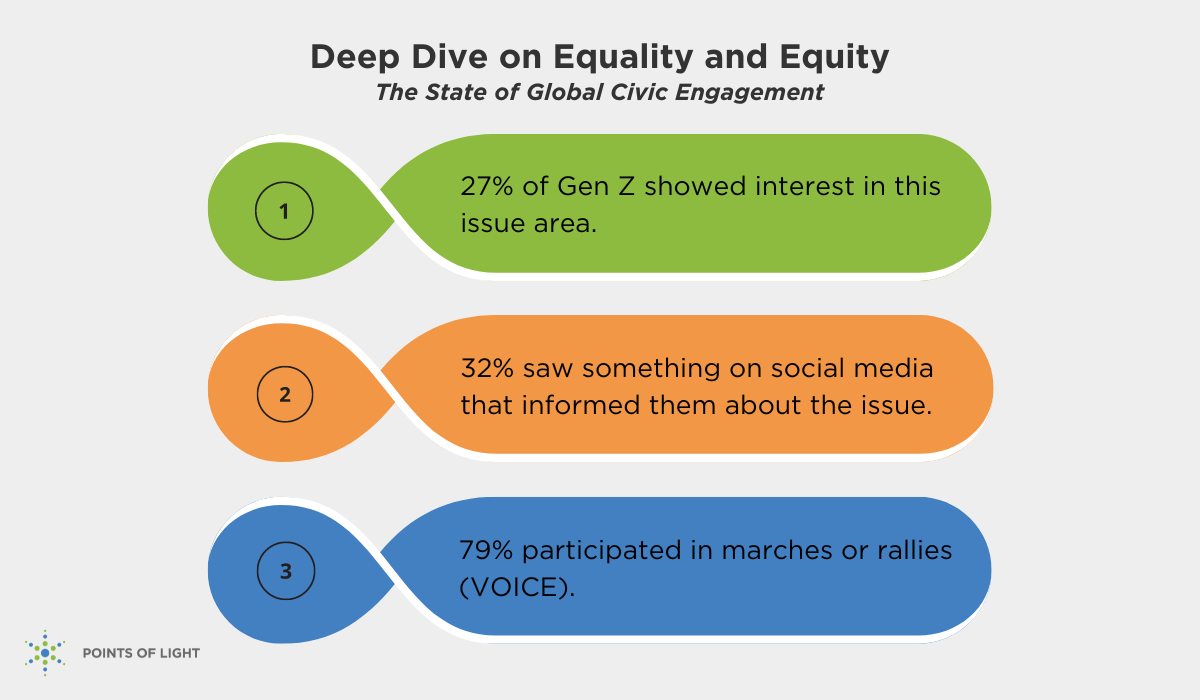The Path Towards Equity and Social Justice: Lessons Learned from Points of Light’s Global Research

Equity and social justice aren’t just buzzwords in the landscape of civic engagement. These issues touch everyone in society in some way, regardless of age, gender, race or socioeconomic status – though the degree of their impact may vary based on individual identity. We all have a responsibility to face these issues and build a more equitable world better for everyone. According to the United Nations Development Programme’s Human Development Index (HDI), which measures the well-being of individuals in different countries, countries with lower inequality tend to have better living conditions, education and health outcomes.
When examining equity among various groups, our research shows us how people are getting engaged with social justice efforts. Whether you yourself are part of a marginalized community or you’re able to advocate for those who are, these insights can inform how you work with your community as you work toward a more just and inclusive society.
Twenty-seven percent of people are concerned about civil rights, racial discrimination and social justice when compared to other issue areas. Of the respondents, Baby Boomers showed the highest concern about these issues at 29%, surpassing Gen X, Millennials and Gen Z. When it comes to civil rights, racial discrimination and social justice, individuals are getting involved primarily through listening and learning about the issues (77%) and donating goods or professional services to a cause or organization – two of the nine elements of the Points of Light Civic Circle®, a framework representing many ways to lead and lend support for causes you care about. Overall, the numbers around social justice activism are lower than they were in the aftermath of May 2020. In thinking about this issue moving forward, the question becomes, how do we sustain energy and action in between catalytic moments?
See how Howard Chen and his fiancée are advocating for the AAPI community in the face of discrimination.
Women’s health and reproductive rights affect many, yet the statistics, perhaps unsurprisingly, show that 32% of women compared to 14% of men are concerned about these issues, because they are also personal. Of the respondents who reported that they took action around this issue, 82% posted or shared content on a social media platform, representing the civic action of voice. While this is a powerful strategy for individual change, in order to permeate structural change, we will have to see increased momentum and belief in the power of other forms of engagement, like voting.
Check out how high school junior Isheta Kulshreshtha is championing an equitable future in policy.
When it comes to disability rights, 32% of respondents have been personally impacted by the issue while 30% report that a close friend and/or family member has been impacted. These statistics demonstrate that this issue is another one that is highly personal, with people who are taking action having either been directly impacted or witnessing the experience of those close to them. As with any issue affecting specific groups of people, disability rights is another crucial area for listening and learning as we consider the needs of those who are living this experience.
Read about how Gianluca Audia is creating adaptive tennis programs for people with Down Syndrome.
Senior and elderly issues are of high concern for those who identify as “seniors” or “elderly,” those who are soon to be in this category or those who have caregiving responsibilities for people in this category. Fifty-eight percent of Baby Boomers expressed interest in this issue area, compared to 29% of Gen X, 21% of Millennials and 18% of Gen Z. Again, a personal connection to the issue seemed to garner the most interest in it, with the top action taken reported to be volunteering, with 49% of people reporting “it makes me feel good to do something for others.” As volunteering can happen in a more formal sense – as with lending time and talent to a nonprofit senior center – as well as in an informal sense – like raking leaves for an elderly neighbor – it may be one of the best ways individuals can create positive change and promote the welfare of seniors.
Find out about how STEM-loving teen Esther Chan is saving seniors from internet scams through education.
In the U.S., we are only seven years post-legalization of marriage equality. Though activists have been paving the way for LGBTQ equality for decades, integration in mainstream society has only happened recently. Perhaps this is why concern for sexual orientation and gender identity rights skews toward younger generations who have largely grown up with an expectation for equality. Notably, Gen Z shows a 27% interest in this issue area, with Baby Boomers at just 13%. This could be another prime opportunity for those less comfortable or familiar with this issue area to listen and learn in order to understand the lived experiences of those who are marginalized and discriminated against due to their gender identity or sexual orientation.
See how Jennifer Croft is merging civic action and inclusivity in her Denver-based group for LGBTQ volunteers.
When we look at the issues above impacting a wide variety of groups, one theme stands out: the people who self-report that they care the most about these issues are those directly impacted by an it or have a loved one directly impacted. In order to see real, sustained change in addressing these issues, we have to see engagement from others outside of these groups.
Want to keep diving? Take a look at these topics to find out how you can leverage our research to take civic action in your own community:
